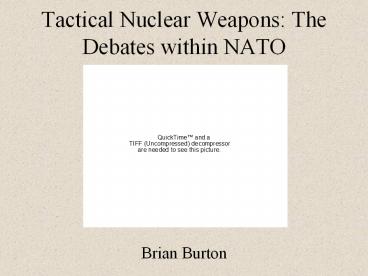Tactical Nuclear Weapons: The Debates within NATO - PowerPoint PPT Presentation
Title:
Tactical Nuclear Weapons: The Debates within NATO
Description:
Korean War 1950-3: US considers use of nuclear weapons against North Korea and China ... First US Army divisions in Europe are equipped with nuclear capability ... – PowerPoint PPT presentation
Number of Views:159
Avg rating:3.0/5.0
Title: Tactical Nuclear Weapons: The Debates within NATO
1
Tactical Nuclear Weapons The Debates within NATO
- Brian Burton
2
What are Tactical Nuclear Weapons?Lance missile
3
(No Transcript)
4
MADM warhead (1-15 kt) W54 SADM (.02-1kt, 163
lbs.)Atomic Demolition Munitions
5
Short-Range AircraftA-7 Corsair II
6
(No Transcript)
7
Background the 1950s
- Korean War 1950-3 US considers use of nuclear
weapons against North Korea and China - Policy of the Eisenhower administration was to
respond to any direct Soviet aggression with
massive retaliation - NATO Carte Blanche exercise, 23-28 June 1955
war-game simulates future European conflict with
Warsaw Pact involving tactical nuclear weapons
the outcome was 355 nuclear detonations in West
Germany, the Low Countries, and northern France
and 5.2 million immediate civilian casualties - First US Army divisions in Europe are equipped
with nuclear capability
8
Should NATO rely on tactical nuclear weapons to
offset the Warsaw Pacts conventional superiority?
- With development complete, there is less overhead
to maintain large nuclear forces than large
conventional forces - Warsaw Pact/Soviet Union will be deterred,
knowing that in the event of war their
conventional forces will be destroyed by NATOs
nuclear weapons
9
Should NATO rely on tactical nuclear weapons to
offset the Warsaw Pacts conventional superiority?
- Political constraints among the allies
- Issues of authorization and control
- Due to massively increased casualties on a
nuclear battlefield, more rather than fewer
conventional forces would be required to carry
out military objectives - Cost of maintaining nuclear infrastructure
absorbs resources that could otherwise be used to
achieve conventional parity with the Warsaw Pact - Slippery slope use of tactical nuclear weapons
in war could lead to a full-scale strategic
nuclear exchange
10
Background the 1960s-1970s
- Under Kennedy, the US policy shifts from massive
retaliation to flexible response the ability
to respond in kind to any Soviet aggression
conventional arms race with the Soviet Union
heats up - US involvement in Vietnam
- Period of détente with the Soviet Union SALT
talks under Nixon - Détente comes to an end in the late 70s during
the Carter administration
11
Issues in the late 1970s-1980s
- Enhanced Radiation Weapons
- Deployment of new Intermediate Nuclear Forces to
Europe - Possible Employment and Reagans Winnable War
12
ERW the Neutron Bomb
- Relies on prompt radiation effects with minimal
blast damage - Fraction of the explosive yield of other
battlefield nuclear weapons - Designed for tactical use radiation kills troops
inside armored vehicles, while the lesser
explosive power supposedly lessens collateral
damage effects
13
ERW the Neutron Bomb
- NATO leaders are prepared to allow President
Carter to deploy ERW in Europe despite political
repercussions - April 1978 Carter decides not to proceed with
production - 1981 Reagan orders production of ERW to proceed,
but keeps the weapons stockpiled in the United
States
14
Modernization of NATO INF
- Soviet deployment of SS-20 IRBMs and Tu-26
Backfire bombers worries Western European
leaders, who request more US nuclear support - US prepares to deploy Pershing II SRBMs and
Tomahawk cruise missiles to Europe - Deployment sparks massive protests in Europe
political support wavers
15
The Winnable War
- ERW development and new deployments of INF and
battlefield systemspreparations for an imminent
war? - SecState Haig in a conventional war, NATO might
fire a nuclear warning shot - Reagan I could see where you could have the
exchange of tactical weapons against troops in
the field without it bringing either one of the
major powers to pushing the button.
16
The Post-Cold War Era
- August 1991 Dissolution of the USSR
- September 1991 President George Bush orders
withdrawal and retirement of all US battlefield
nuclear systems - Where might tactical weapons be needed in the
future? - Rogue states
- Heavy shelter penetration
- Future conventional conflict?
17
(No Transcript)
18
Sources
- Boutwell, Jeffrey D., Paul Doty, and Gregory F.
Treverton, eds. The Nuclear Confrontation in
Europe. Dover, MA Auburn House Publishing
Company, 1985. - Daalder, Ivo H. The Nature and Practice of
Flexible Response. New York Columbia University
Press, 1991. - Kromer, Robert. New Weapons and NATO Solutions
or Irritants? Westport, CT Greenwood Press,
Inc., 1987. - Nurick, Robert, ed. Nuclear Weapons an European
Security. Hampshire, England Gower Publishing
Company Limited, 1984. - Olive, Marsha McGraw, and Jeffrey D. Porro.
Nuclear Weapons in Europe. Lexington, MA
Lexington Books, 1983. - Pierre, Andrew J., ed. Nuclear Weapons in
Europe. New York New York University Press,
1984.































